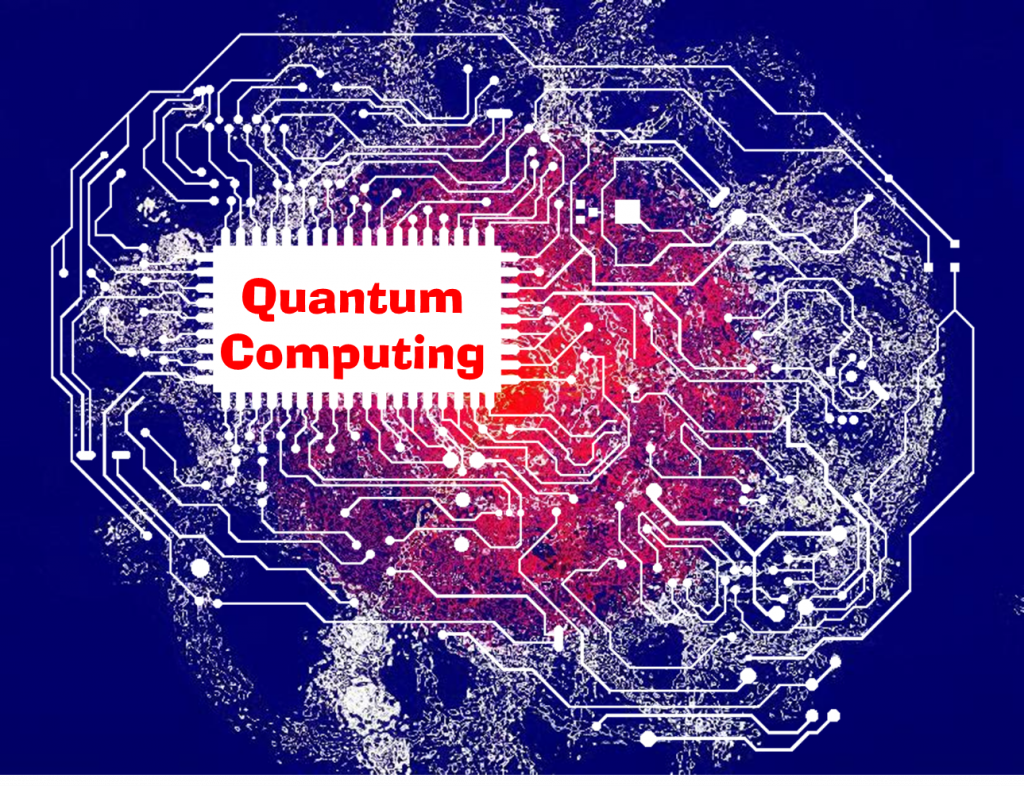Even though a practical programmable quantum computer has yet to be developed, John Loeffler (@ThisDotJohn) writes, “The era of classical computing is coming to an end.”[1] He adds, “Scientists are anticipating the arrival of quantum computing [and are] designing ambitious quantum algorithms that tackle math’s greatest challenges.” The most fundamental characteristic of classical computing is binary mathematics. The Singularity Hub staff explains, “Classical computers (like the one you may be reading this on) calculate using bits, or binary digits, which can have only one of two values, either 1 or 0.”[2] The reason Loeffler can declare quantum computers will usher in the end of the classical computing era is because quantum computers don’t work using binary digits. The Singularity Hub staff explains, “Quantum computers calculate using quantum bits, known as qubits. Qubits can be both 1 and 0 simultaneously — meaning they can perform two calculations at once. This is only possible on the smallest scales, where the laws of quantum physics hold sway, and makes for massively faster computing compared to digital computers.”
If that sounds weird, it is. As noted above, the weirdness begins with the fact that quantum computers are black boxes in which a quantum bit (aka a qubit) can simultaneously be both a zero and a one — this phenomenon is called superposition. The phenomenon was described by physicist Erwin Schrödinger who noted that if his cat found itself in the weird quantum world it could simultaneously be both dead and alive. The weirdness continues with the fact that a quantum particle can simultaneously appear to be in two places at once. This phenomenon — called entanglement — involves a pair of quantum particles linked together in a such a way that when one particle is altered its twin is instantaneously altered in exactly the same way regardless of how far apart the entangled particles may be. Professor Albert Einstein famously called entanglement “spooky action at a distance.” When a physicist as brilliant as Einstein finds the quantum world spooky, you better believe it’s true. The ability for a qubit to perform two calculations at once is what will give a quantum computer amazing power. James Norman explains, “Quantum computers can be game changers because they can solve important problems no existing computer can. While conventional computing scales linearly, QC scales exponentially when adding new bits. Exponential scaling always wins, and it’s never close.”[3]
Will quantum computing require new math?
Because quantum computers will calculate differently than classical computers, they will require different algorithms to work optimally. Kevin Hartnett (@KSHartnett) explains, “In practice, quantum computers can’t run many programs that classical computers can, because they’re not allowed to selectively forget information. A new algorithm for multiplication shows a way around that problem.”[4] He further explains:
“In theory, [quantum computers] can do anything that a classical computer can. In practice, however, the quantumness in a quantum computer makes it nearly impossible to efficiently run some of the most important classical algorithms. Which is why a paper posted on April 15 [2019] is good news. In it, Craig Gidney, a software engineer at Google AI Quantum in Santa Barbara, California, describes a quantum version of a classical algorithm for quickly multiplying very large numbers. Classical computers have been running this algorithm for a long time. Before Gidney’s paper it was unclear whether it would be possible to retrofit it for quantum machines. Even more important, the multiplication algorithm is part of a class of nearly ubiquitous algorithms in computer science. Gidney expects that his new technique will allow quantum computers to implement this class of algorithms, which until now appeared to be too cumbersome to be used in a quantum machine.”
That’s good news. The following video from Singularity University explains why new algorithms will be required for quantum computers.
The video notes, to date, only a few quantum computing algorithms have been developed. Stephen Jordan, a senior researcher with Microsoft, provides a catalog of these algorithms along with their uses.[5] The catalog was last updated in 2018 and Jordan requests you contact him with any omissions or updates you may find.
Will quantum computing change the world?
With all the challenges and high costs associated with quantum computers, you might be wondering what all the fuss is about. Futurist Bernard Marr (@BernardMarr) predicts, “Quantum computers will disrupt every industry. They will change the way we do business and the security we have in place to safeguard data, how we fight disease and invent new materials, and solve health and climate problems.”[6] To bolster his prediction, he suggests six ways quantum computing will change our world. They are:
1. Online security. “Our current data encryption tactics will become obsolete. … The good news is that significant work has been done to develop quantum encryption methods such as quantum key distribution, an ultra-secure communication method that requires a key to decipher a message. Thanks to the peculiar properties of quantum mechanics, if the message gets intercepted, no one else can read it.”
2. Artificial intelligence. “Quantum computers can analyze large quantities of data to provide artificial intelligence machines the feedback required to improve performance. Quantum computers are able to analyze the data to provide feedback much more efficiently than traditional computers and therefore the learning curve for artificial intelligence machines is shortened.”
3. Drug development. “Since quantum computers can review multiple molecules, proteins and chemicals simultaneously, they make it possible for chemists to determine viable drug options quicker.”
4. Improved weather forecasting and climate change predictions. “Since quantum computers can analyze all the data at once, meteorologists will have a much better idea of when bad weather will strike to alert people to ultimately save lives, anguish and money.”
5. Traffic control. “Whether in the air or on the ground, quantum computers will help to streamline traffic control. They will be able to quickly calculate the optimal routes concurrently which allows for efficient scheduling and would reduce traffic congestion.”
6. Tackling the whole problem. “Instead of troubleshooting issues bit by bit as we do now with classical computers, quantum computers tackle the entire problem at once.”
Marr concludes, “Quantum computers give us the ability to solve complex problems that are beyond the capabilities of classical computers. We’re heading down an entirely new field of physics, and by its very nature there will be discoveries, innovations and solutions we have never dreamed of yet.”
Concluding thoughts
Even though the video indicated future students may be doing homework on quantum computers, Loeffler isn’t so sure. He explains, “The technology is in its infancy and there are any number of reasons to doubt that we’ll ever see the quantum computer equivalent of the Apple II home computer. It’s not just the qubits you have to master; you’d also have to discover a material capable of room-temperature-ish superconductivity as well as figure out how you’d maintain an internal environment for the qubits that needs to be kept as close to absolute zero as possible to work.” A practical, programmable quantum computer appears to be just around the corner — up until now, however, around every corner there appears to be another corner. In the end, that means the classical computing era has a few more good years.
Footnotes
[1] John Loeffler, “Quantum Algorithms and the Future of Post-Classical Computing,” Interesting Engineering, 19 May 2019.
[2] Staff, “Why Quantum Computers Will Be Exponentially Faster Than Digital Computers,” Singularity Hub, 18 September 2017.
[3] James Norman, “Quantum Computing Will Revolutionize Data Analysis. Maybe Soon,” Seeking Alpha, 14 March 2018.
[4] Kevin Hartnett, “A New Approach to Multiplication Opens the Door to Better Quantum Computers,” Quanta Magazine, 24 April 2019.
[5] Stephen Jordan, “Algebraic and Number Theoretic Algorithms,” Quantum Algorithm Zoo, 22 April 2018.
[6] Bernard Marr, “6 Practical Examples Of How Quantum Computing Will Change Our World,” Forbes, 10 July 2017.





